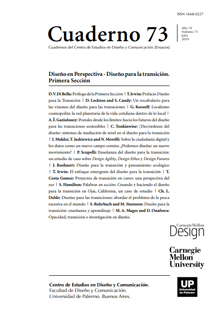On Digital Citizenship and Data as a New Commons: Can We Design a New Movement?
Abstract
Along with the urgent need to reinvent our society, a series of paradigm shifts are already shaping transitions toward a more participatory and digital society. The current work takes stock of the promise of open data as a new resource and elaborates upon the maker movement, which has spurred people’s capacity to participate and has provided tools and infrastructures to unleash people’s intrinsic ability to create and innovate. We explore how open data can be a new commons, discuss how hackathons can support digital citizenship, and reflect on the role of Transition Design in creating ecosystems around the common resource and in building capacity
References
Bertot, J. C., Jaeger, P. T., & Grimes, J. M. (2010). Using ICTs to create a culture of transparency: E-government and social media as openness and anti-corruption tools for societies. Government Information Quarterly, 27(3), 264-271.
Botsman, R. (2013, November 21). The sharing economy lacks a shared definition. Retrieved from: http://www.fastcoexist.com/3022028/the-sharing-economy-lacks-a-shareddefinition#4
Dekkers, M., Polman, F., te Velde, R., & de Vries, M. (2006, June). Mepsir: Measuring European public sector information resources. Final report of study on exploitation of public sector information - benchmarking of EU framework conditions. Brussels: European Commission.
European Commission (2003). Communication of the re-use of public sector information - Review of Directive 2003/98/EC. Regulation.
Irwin, T., Kossoff, G., & Tonkinwise, C. (2015). Transition Design provocation. Design Philosophy Papers, 13(1), 3-11.
Kroes, N. (2011). Public data for all - opening up Europe’s public sector: 2011. Retrieved from http://blogs.ec.europa.eu/neelie-kroes/public-datafor-all-–-opening-up-europespublic-sector/
Linebaugh, P. (2009). Magna Carta manifesto: Liberties and commons for all. Berkeley, CA: University of California Press.
Lodato, T. & DiSalvo, C. (2016). Issue-oriented hackathons as material participation. New Media and Society, 18(4), 539-557.
Loorbach, D. (2014, October 31). To transition! Governance panarchy in the new transformation. Inaugural Address, Rotterdam: Erasmus University Rotterdam.
Manzini, E., & Rizzo, F. (2011). Small projects/large changes: Participatory design as an open participated process. CoDesign, 7(3-4), 199-215.
Max-Neef, M. A. (1991). Human scale development: conception, application and further reflections. New York: The Apex Press.
Morelli, N., Aguilar, M., Concilio, G., De Götzen, A., Mulder, I., Pedersen, J., & Torntoft, L. K. (2017). Framing design to support social innovation: The Open4Citizens Project. The Design Journal, 20(sup1), S3171-S3184. doi:10.1080/14606925.2017.1352823
Morelli, N., De Götzen, A., Mulder, I., Concilio, G., Pedersen, J., Jaskiewicz, T., & Aguilar, M. (in press). Open data as a new common. Empowering citizens to make meaningful use of a new resource. Proceedings of INSCI 2017, the 4th International Conference on Internet Science.
Mulder, I., & Loorbach, D. (in press). Rethinking design: A critical perspective to embrace societal challenges. Proceedings of Transition Design Symposium 2016.
Obama, B. (2009). Transparency and Open Government: The White House: 2009. Retrieved from http://www.whitehouse.gov/the_press_office/Transparency_and_Open_Government.
Vargo, S. L., & Lusch, R. F. (2008). Service-dominant logic: Continuing the evolution. Journal of the Academy of Marketing Science, 36, 1-10.
Los autores/as que publiquen en esta revista ceden los derechos de autor y de publicación a "Cuadernos del Centro de Estudios de Diseño y Comunicación", Aceptando el registro de su trabajo bajo una licencia de atribución de Creative Commons, que permite a terceros utilizar lo publicado siempre que de el crédito pertinente a los autores y a esta revista.


